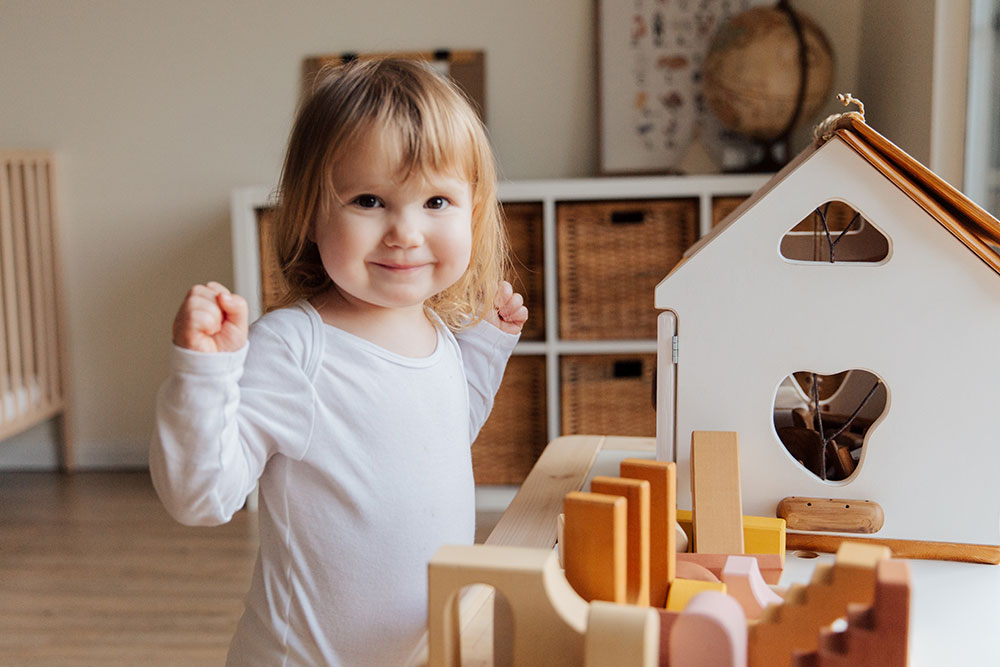Montessori education, developed by Dr. Maria Montessori in the early 1900s, emphasizes child-led learning, practical life skills, and the use of natural materials.
Early childhood development is crucial, laying the foundation for future learning and development. Montessori toys are designed to promote learning and development in young children based on Montessori principles.
Characteristics and Benefits of Montessori Toys
Montessori toys are made from natural materials and are characterized by their simplicity and open-ended nature. They promote sensory exploration, incorporating different textures, shapes, and colors. Key benefits of Montessori toys for early childhood development include:
Development of fine motor skills
Montessori toys, such as wooden blocks, puzzles, and shape sorters, help children develop fine motor skills crucial for writing, drawing, and using utensils. They also promote hand-eye coordination and spatial awareness.
Encourages independence and self-confidence
Montessori toys to foster independence and self-confidence as children choose their activities and work at their own pace. These toys teach practical life skills like cooking, cleaning, and self-care.
Enhances language development and literacy skills
Montessori toys, such as books, language cards, and storytelling sets, promote language development and literacy skills, helping children develop vocabulary, grammar, and communication skills.
Fosters math and science learning
Montessori toys, like balance scales, counting beads, and science experiment kits, promote math and science learning, teaching concepts such as counting, measuring, and scientific inquiry.
Promotes sensory exploration and development
Montessori toys, incorporating different textures, shapes, and colors, promote sensory exploration and development, helping children develop their senses of touch, sight, sound, and smell.
Supports social and emotional learning
Montessori toys, such as cooperative games, play kitchen sets, and dollhouses, promote social and emotional learning, teaching children cooperation, empathy, and emotional regulation.
The Montessori approach promotes lifelong learning and success, with Montessori-educated children often having better social and academic outcomes compared to children educated through traditional methods. Montessori education respects each child’s individual learning style and pace, fostering a love for learning and intrinsic motivation.
How to Choose Montessori Toys
When selecting Montessori toys, consider the following factors:
Developmental appropriateness
Choose toys that are appropriate for your child’s age and abilities. Montessori toys typically have age recommendations to guide your selection.
Natural materials and safety
Choose toys made from natural materials and free from harmful chemicals. Montessori toys prioritize environmental friendliness and safety.
Open-ended and explorative nature
Choose toys that are open-ended and allow for exploration and creativity. Montessori toys should encourage children to use their imagination and creativity.
Examples of Montessori toys include wooden blocks, shape sorters, puzzles, stacking toys, counting beads, balance scales, language cards, books, and sensory play kits.
Conclusion
Parents play a critical role in their children’s early development, and Montessori toys can be an excellent way to support their growth. Montessori toys offer educational benefits, promoting creativity, independence, and confidence in young children.
Montessori toys are just one aspect of Montessori education. If you are interested in learning more about Montessori education, many resources are available, including books, articles, and online courses.
In conclusion, Montessori toys are a valuable investment for parents supporting their child’s growth and development. By providing open-ended, natural materials promoting hands-on exploration and creativity, parents can help children develop essential skills for a lifetime.

